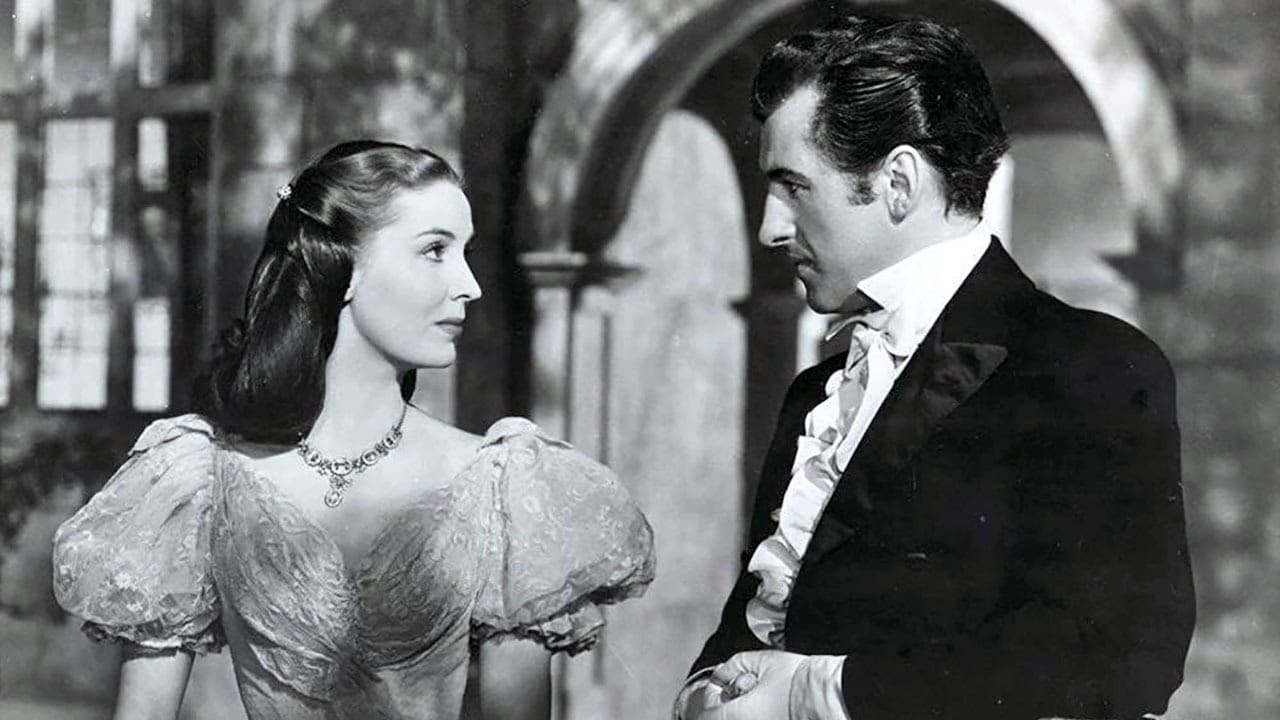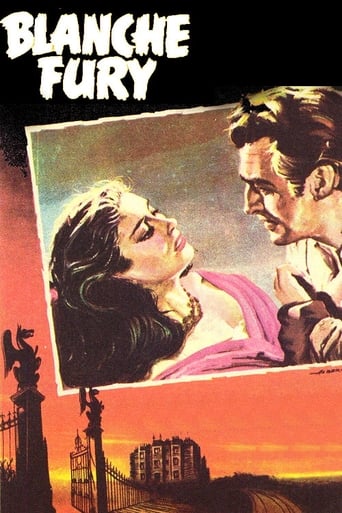Comwayon
A Disappointing Continuation
Nessieldwi
Very interesting film. Was caught on the premise when seeing the trailer but unsure as to what the outcome would be for the showing. As it turns out, it was a very good film.
Bob
This is one of the best movies I’ve seen in a very long time. You have to go and see this on the big screen.
Jerrie
It's a good bad... and worth a popcorn matinée. While it's easy to lament what could have been...
bkoganbing
Like his contemporary James Mason who came up roughly the same time as he did, Stewart Granger seemed to be born to play in these romance novel roles. In Blanche Fury he's got a nasty grudge against the Fury family who have kept him working as a groom on their estate. He's one of them, but born on the wrong side of the blanket as they said in those days. There's a dual focus in this film and it's on Valerie Hobson playing the title role as well. She's also knocked about a bit kind of like George Eastman in An American Tragedy, she's one of them, but only distantly. Still she's on the right side of the blanket and she determines to marry Michael Gough the heir to the estate for a life of ease and comfort.Granger like the real life James Scott the Duke of Monmouth searched for a connection to his father King Charles II to prove he was heir to the throne. Didn't happen for him and didn't happen for Granger But what does happen is that he gets Hobson's mojo going far more than the insipid and privileged Gough does.These are the ingredients of Blanche Fury and if you like these movies and read these novels you can pretty much guess what happens. Hobson and Granger are a stirring romantic pair, but Granger in his desire to improve his station goes quite a bit off kilter. Hobson has a choice to make and she makes it.As for who gets the Fury estate. For that you have to see Blanche Fury.
Spikeopath
Blanche Fullerton accepts an invitation to go and work for her wealthy Uncle out on the Clare estate. Tho the estate is the ancestral home to the Fury family, the Fullerton's take the name of Fury to be their own and run the estate as the rightful heirs. Philip Thorn believes he is the rightful heir to the estate but just can't find the proof needed to claim what he feels is rightfully his. Once Blanche enters the estate the men of the home have their heads turned, and from that point on Clare estate, and the whole Fury dynasty, is in danger of going down a very dark path that can may only lead to pain and misery. Is the ape curse of the Fury's about to strike again?There is a good chance that I'll be reviewing this picture with a hint of bias, for Blanche Fury has everything that I personally look for in a Gothic classic picture. Two lead stars firing on all cylinders, both Stewart Granger and Valerie Hobson positively ooze grace and quality amongst the glorious colour and corking costumes. The mansion of the piece is just perfect (Wootton Lodge, Staffordshire, England), a poetic stone built structure by day that is surrounded by rolling countryside, but by night it's a hauntingly monolithic place of dreams and simmering passions. The dialect perfectly befits the late 40s British setting, where the story itself is crammed with passions and dastardly motives, adulterous leanings and murderous intent. But above all else it's the ending that seals the deal, as our protagonists respective futures unravel in yet another trip down some dark twisty road. Based on the novel written by Joseph Shearing (who was actually Marjorie Bowen), the inspiration for the story is a real life case from 1848, this itself carries with it no small amount of potency, adding still further a fleck of nastiness to the unfolding drama. Blanche Fury is very much one for those who like Gothic melodramas or uneasy mansion set thrillers, the likes of Dragonwyck, House Of Usher, perhaps even Alfred Hitchcock's wonderful Rebecca. It's tightly directed by Marc Allégret and acted accordingly, whilst also technically the picture scores high as the score (Clifton Parker) and the photography (Guy Green/Geoffrey Unsworth) gives the picture an all round quality production. Blanche Fury, as a story itself? Well it's a little gem from the golden sub-genre of Gothic melodramas. At the time of writing Blanche Fury is still searching for a wider, more appreciative, audience, so if you get the chance to see it then don't pass up the chance because it's a must for fans of the films mentioned above. 8.5/10
theowinthrop
The film is one I only saw partially once, two or three years ago. I wish it was on Video or DVD. Other early Stewart Granger historic films are out - SARABAND FOR DEAD LOVERS and CAPTAIN BOYCOTT. This one was based on a novel by Joseph Shearing, the female novelist who used a male pseudonym. All her books were based on actual crimes - see my comments on the contermporary film SO EVIL MY LOVE, with Ray Milland and Ann Todd. Here, Shearing turns to the murder, at Stanfield Hall, near Norwich, England of Isaac Jermy and his son (incredibly named Isaac Jermy Jermy)in November 1848. The perpetrator was a farmer, James Blomfield Rush, who was a tenant of the Jermys but was on bad terms with them for a series of debts he owed them, and attempts to claim title to the farm and other properties. Complicating the matter was that the Jermys title to their estate was subject to a law suit. Rush dressed in a disguise, and walked over two miles in the dark to the estate, where he shot the Jermys down in their home, and then shot the wife of the son and their maid. Apparently he wanted no witnesses. Unfortunately there were too many. Also, his alibi was supposed to be his children's governess, Emily Sandford, and she turned out to be more truthful at his trial than he hoped. The trial was notable because Rush insisted in defending himself. It turned out that he had a fool for a client. Rush was found guilty and hanged. The full story is not quite used in the movie, but bits and parts of it certainly are.
suppascoops
I first discovered this little gem on tv a few years ago and loved it , i taped it and for some unknown reason kept watching it over and over it has a kind of hypnotic pull to i mean you have to really get into, i guess its not for everybody but it has been held in some regard up until recently,martin scorseses mentioned this as one of his guilty pleasures in film comment years ago and popular film presenter and critic from australia bill collins said while presenting another film that this would have to be one of the best british films from the forties.I totally agree it has a great gothic feel and the decor is marvelous as is the estate it was filmed on it has good solid performances and stewart granger is espescially good.Take note of the gypsy elements because at the time these points were crowd pullers other granger films to watch out for with similarities - "moonfleet","caravan","saraband for dead lovers","madonna of the seven moons"

